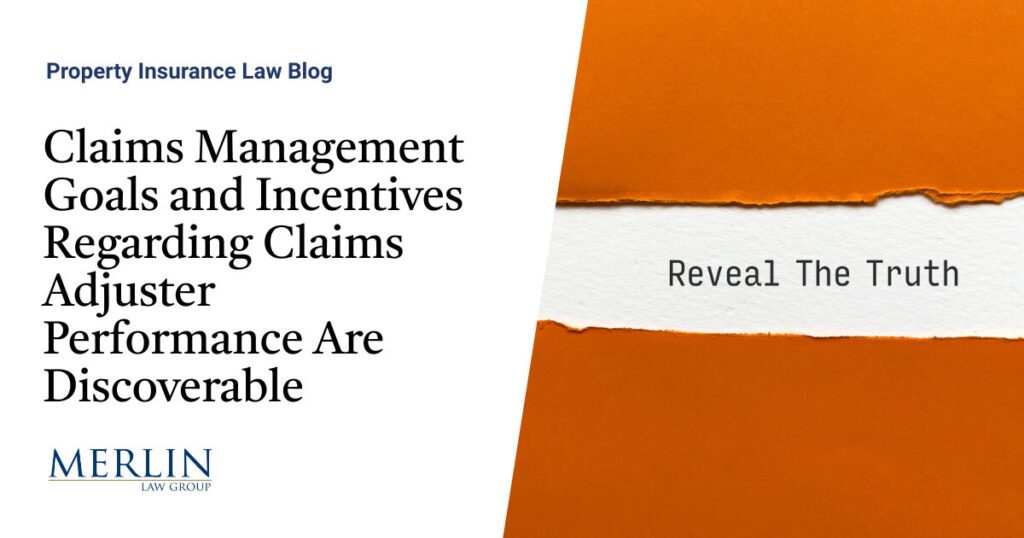Claims Management Goals and Incentives Regarding Claims Adjuster Performance Are Discoverable

Can you imagine if an insurance company had a publicly stated goal to fully and promptly pay all benefits owed under an insurance policy? Can any insurance company attorney answer why their client does not have this goal or incentive for claims performance? Will any claims manager of an insurance company reply why this goal is never to be found? I expect that we will only hear crickets from the insurance company’s public relations propaganda team regarding the answers to these questions.
In a significant legal decision, a federal court recently ruled on a motion to compel discovery in the case of Barten v. State Farm Mutual Automobile Insurance Company, ordering State Farm to turn over documents related to its claims handling practices and financial incentives. 1 This ruling is pivotal in the ongoing discussion about transparency and accountability concerning how financial goals and incentives may influence claims decisions.
In 2012, Barten sued State Farm for breach of contract and insurance bad faith, a case that was ultimately settled. However, Barten alleges that State Farm has since reverted to bad faith practices, prompting him to file a second lawsuit. His current allegations include underpayment of benefits, ignored communications, and unreasonable requests for information.
Barten’s discovery requests fell into two main categories:
Documents Related to Claim Handling: This included the complete claim file, communications about Barten’s claim, and any relevant documents held by State Farm’s employees.
Information on Financial Incentives: Barten sought documents related to State Farm’s economic performance measures, goals, and incentives that might influence claims adjustors to deny claims.
State Farm objected on several grounds, including claims of irrelevance, overbreadth, undue burden, and issues of privilege. Specifically, State Farm argued that information regarding financial incentives was not relevant unless Barten could first make a prima facie case for punitive damages.
The court meticulously addressed each of State Farm’s objections:
Relevance: The court held that both categories of documents sought by Barten were relevant to his bad faith claim. Information about the handling of his claim was directly pertinent, while documents about financial incentives were relevant as they could show a motive for wrongful denials.
Temporal and Geographic Scope: The court limited the temporal scope of discovery to a five-year period prior to the filing of the lawsuit, finding this to be proportional to the needs of the case. However, it disagreed with State Farm’s geographic limitation, ruling that companywide policies and incentives were relevant regardless of the specific region handling Barten’s claim.
Form of Production: While State Farm objected to producing documents in their native electronic format, the court ruled that such production was reasonable and necessary for certain types of documents like emails.
Boilerplate Objections: State Farm’s general objections regarding vagueness, undue burden, and privilege were largely overruled. The court emphasized that objections must be specific and substantiated, which State Farm failed to do in most instances.
This case underscores the importance of transparency and accountability in the insurance industry’s management of claims adjusters. By compelling State Farm to disclose documents related to their financial goals and incentives, the court highlighted how such information could be critical in proving or disproving allegations of bad faith. This case reaffirms the precedent that insurance companies cannot hide behind broad objections to avoid disclosing potentially damaging information and touches on the motivations of claims adjusters to fully and promptly pay claims.
From a public policy standpoint, this case decision represents a significant step toward ensuring that insurance companies are held accountable for their claims handling practices. By granting the motion to compel discovery, the court has reinforced the notion that financial incentives and internal goals within insurance companies must be transparent, especially when they potentially impact the fair treatment of policyholders. This case serves as a reminder that policyholders have the right to scrutinize the motivations behind their insurers’ decisions, bolstering the pursuit of justice in insurance disputes.
For those interested in this important topic, please read What Causes Bad Faith Claims Practices? One Reason Is Financial Incentives and Goals, and Why Should Property Insurance Claims Handling Training Programs, Processes and Incentives Be Secret?
Thought For The Day
Trust is the glue of life. It’s the most essential ingredient in effective communication. It’s the foundational principle that holds all relationships.
—Stephen R. Covey
1 Barten v. State Farm Mut. Auto. Ins. Co., No. 4:23-cv-00267 (D. Ariz. June 10, 2024).



